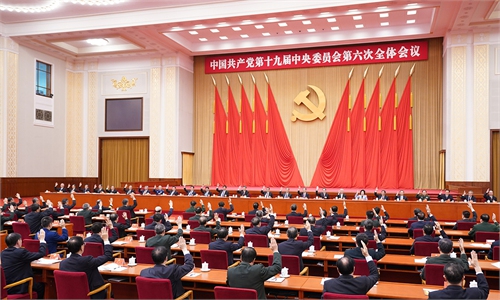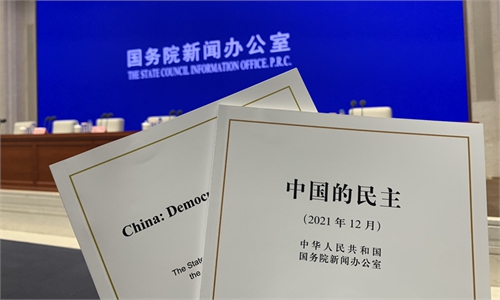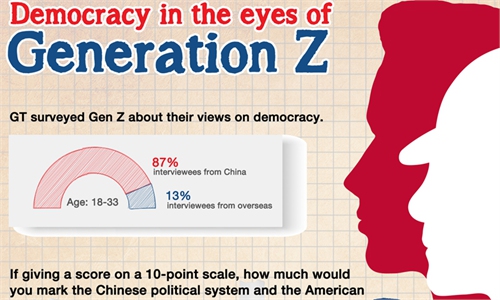For some, democracy is a value in crisis or a system that awakens the masses from four years of slumber just to cast a ballot.. But for the Chinese, it is something to go on about on a daily basis but something witnessed, experienced and participated in from a very young age, as democracy runs through every link of the country's governance.
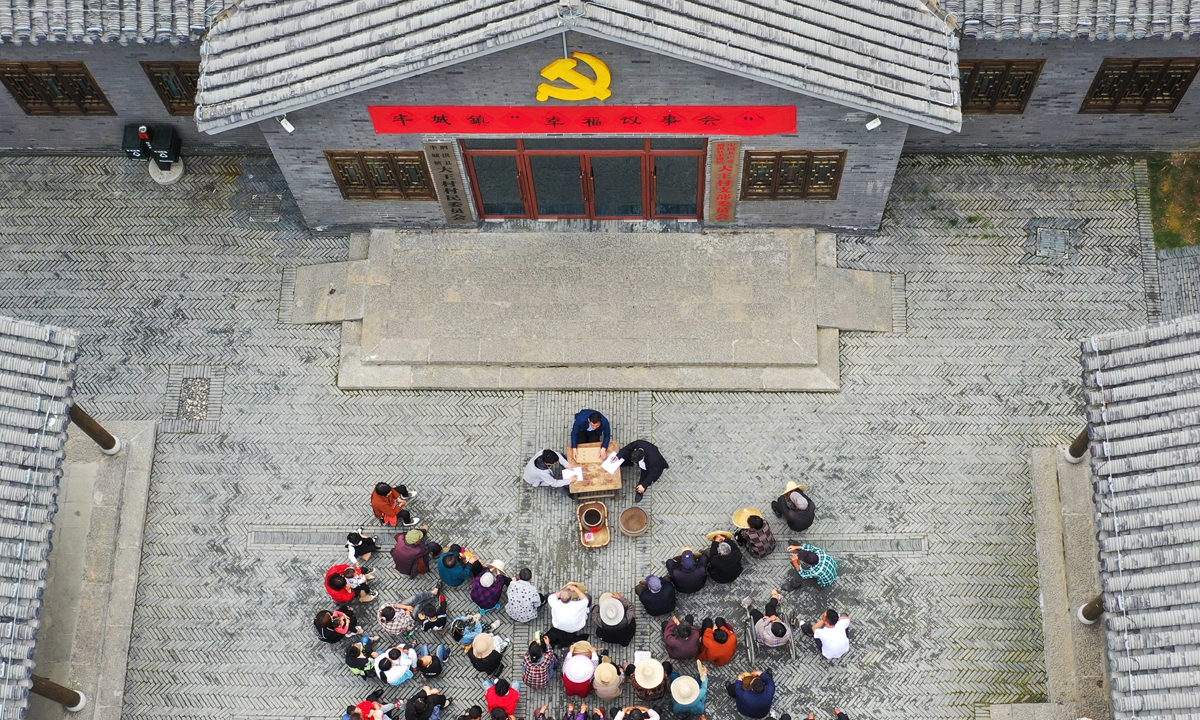
Villagers in Dawang village, Suqian of East China's Jiangsu Province attend the village's "Happy Congress" on May 23, 2021. Photo: VCG
Learn, practice democracy from young ageIn March 2019, a group of high school students in Zhengzhou, Central China's Henan Province held a virtual meeting with Wang Zhongli, local education bureau chief and deputy to the 13th National People's Congress (NPC).
"How did you come up with the proposal suggesting that the central government allocate a budget for rural teachers to solve their housing difficulties? What kind of research did you do before proposing that?" student Lin Kexin asked.
Rural education is key to urbanization and rural revitalization. The proposal aims to solve teachers' worries and encourage them to stay in rural areas for the benefit of local children, Wang responded.
Wang added that concrete plans for housing and budget support for sharing education resources to villages via the internet came to maturity during his half-year field trip to villages in Henan.
Wang cares about rural students and is very approachable, a graduate of Zhengzhou Foreign Language School who attended the virtual meeting recalled, telling the Global Times that the NPC annual session was held 700 kilometers away in capital Beijing, a long distance away, but he still felt as though they were close because what was discussed by the deputies was relevant to ordinary people. The high school also has a Model NPC organization, similar to Model United Nations, where students learn and practice to better understand one of China's essential democratic participation processes.
At an event in May 2021, students mimic a meeting of Zhengzhou People's Congress with some submitting reports by environmental, education, and health authorities while others listen to reports, offer advice, and vote to approve them.
The people's congresses at all levels are local agencies of state power. All administrative, supervisory, judicial and procuratorial organs of the state are created by the people's congresses, according to a white paper released on December 4 that clearly and concisely introduces China's whole-process people's democracy.
The people's congresses have functions of legislation, appointment and removal of government officials, and decision-making and supervision of corresponding administrative levels. This system is China's fundamental political system, and the ultimate approach and optimal solution to guaranteeing the people's status as masters of the country.
Gong Xiaohong, an instructor with the high school Model NPC, told the Global Times that direct communication with NPC deputies enables the youth to better understand how the system is relevant to everyone, and how people's voices are heard and affect legislation and policies.
Via discussions on modeling event topics and the drafting of attendant reports, students have a deep understanding of governance problems in the society, ranging from reducing the school workload and cyber bullying, to epidemic control and animal protection.
The Model NPC events provide students with a vivid experience of how the local people's congress operates, Gong continued, adding that they can then grow into responsible "masters of the country." When they turn into adults and vote, they can fully understand how important the election process is and how sacred their ballots are.
Another program China launches to engage the youth in whole-process people's democracy is the Young Marxists program, which covers university students, state-owned enterprise employees, and village officials and social workers.
Trainees of the program not only receive lecture sessions on China's democratic revolution history and the development of China's democracy, but also engage in the process in person.
Via the program, young trainees with Marxist beliefs become officials, company leaders and social workers with the full awareness of the need to participate in the administration and discussion of state affairs, and evolve the capabilities to do so.
Looking into the process
The concept of whole-process people's congress was put forward by President Xi Jinping in 2019 during his visit to a civic center in Shanghai where legislation was discussed at local community level.
Whole-process people's democracy covers all sectors of the society through electoral democracy, consultative democracy and community-level democracy, and is applied through a combination of elections, consultations, decision-making, management and oversight.
People's status as masters of the country is the essence and most distinctive feature of China's democracy.
In a recent visit to Pingyao county, North China's Shanxi Province, the Global Times reporter witnessed how whole-process people's democracy is practiced in locals' daily lives: Villagers, mostly the elderly, sit down around trees debating topics like the education of their grandchildren or the allocation of resources.
Villagers do not blindly listen to village chiefs, but offer their suggestions. Sometimes they might even argue fiercely, while loud laughter bursts forth when they agree with each other.
They select village chiefs who can represent their interests and lead the village to a better future, and the process is a key component of China's community-level self-governance, one example of the basic-level democracy. Similarly, urban residents can select their community chiefs to represent their interests and needs.
The villagers also directly elect county-level people's congress deputies while higher-level people's congress delegates are elected indirectly.
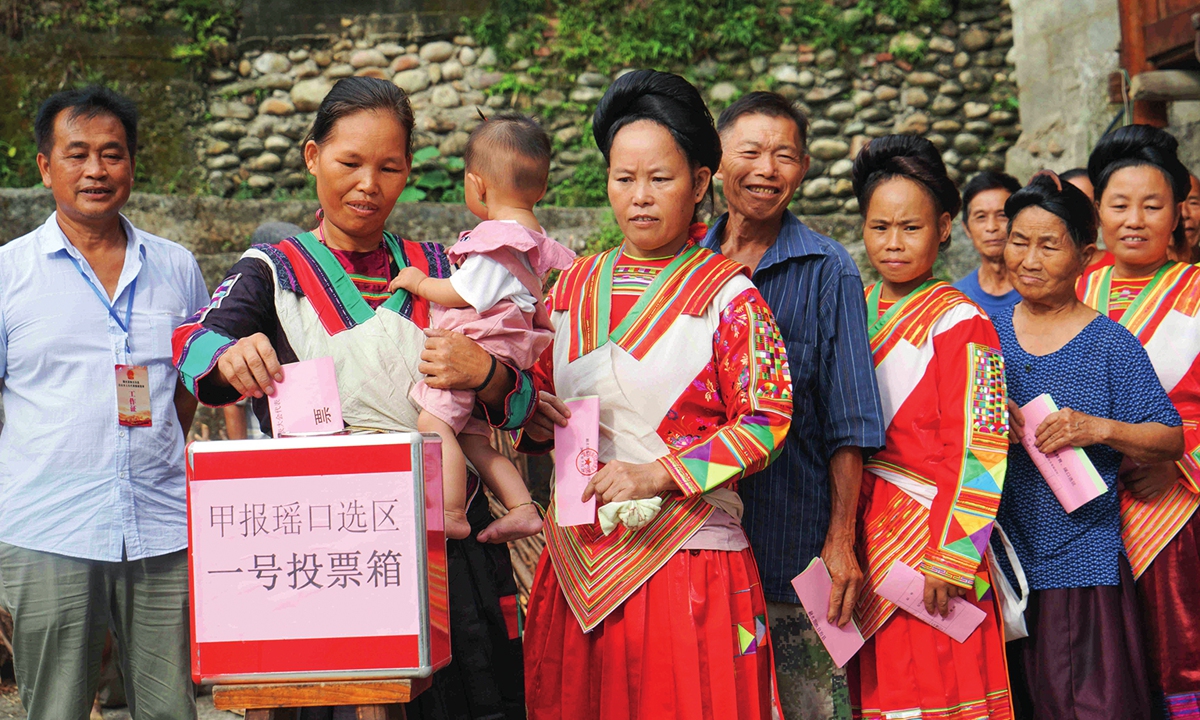
Some Yao ethic people in traditional cloths vote for deputies of the local people's congress in Liuzhou, Southwest China's Guangxi Zhuang Autonomous Region on July 22, 2021. Photo: VCG
The villagers also directly elect county- and township-level people's congress deputies while higher-level people's congress delegates are elected indirectly. So far, about 2.5 million deputies of these two levels are elected directly by people and the participation reaches 90 percent.The Global Times also found multiple places, including Henan, have invited Young Marxists program trainees to audit meetings of local committees of the Chinese People's Political Consultative Conference (CPPCC), to learn about affairs discussed and allow them to play an advisory role.
Those trainees are prospective people's congresses deputies and Party or government officials making it important for them to observe, participate in the democracy practice, and become core forces in the country's governance, experts said.
Experts said it is a common misunderstanding that China only has one party. The correct way to put it is China has one governing party but is governed through multiparty cooperation and political consultation with the CPPCC as a crucial mechanism.
China's political party system is not a one-party rule system. Nor is it one in which multiple parties vie for power and govern in turn, read the white paper on China's democracy.
When the ruling power shifts among multiple parties, and when lawmakers are professional politicians, it is difficult for a democracy to avoid becoming hollow and superficial, experts said.
Under the US democratic system, politicians are agents of interest groups, rather than representing the interests of the majority of voters and the interests of the country as a whole.
Kong Yuan, a research fellow at the Chinese Academy of Social Sciences, said such democracy has led to oligarchy and created social strife, which are the root cause of governance problems, including racism and pandemic response failures.
Besides other parties, the CPPCC also involves major social organizations like All-China Federation of Trade Unions, All-China Federation of Women, representatives from different professions, religions and ethnic groups, as well as specially invited people from Hong Kong and Macao.
Representing people's benefits
When US democracy becomes a money-centric game for a chosen few, lawmakers can hardly draft bills that can bring about benefits to the common people.
In contrast, Chinese lawmakers are constantly listening to the people, via aforementioned direct exchanges with the public, via their communications in their daily work, and via the structure of basic-level contact stations for legislation.
Taking the Civil Code as an example, the draft passed through 10 reviews at the NPC Standing Committee, 10 open solicitations of public opinions, and three discussions of deputies to the NPC before it was voted through.
The people's voices are heard by their deputies, expressed online, and conveyed to legislators through the basic level points of contact for legislation. China now has 22 such points of contact at local people's congresses, as well as in universities, science parks and communities.
On the first floor of Gubei civic center in Hongqiao subdistrict, Changning district of Shanghai, a display cabinet shows pamphlets of China's laws and notes on soliciting people's opinions on draft laws. Since 2015, the neighborhood has been designated as a point of contact for legislation.
It is the civic center President Xi visited and raised the concept of whole-process people's democracy.
The contact point has so far solicited opinions on 60 draft laws and summarized and sorted through more than 1,000 suggestions, of which 92 have been adopted.
Wu Xinhui, a legislative coordinator and director of the Shanghai Kangming Law Firm, has been in charge of gathering people's opinions via door-to-door visits or through conducting interviews. Wu has witnessed how people have been encouraged and educated to participate in the legislative process.
Wu once handled a case in which a senior in her 90s had suffered from violence within the family and noticed that the draft Anti-Domestic Violence Law gives far more attention to children and women while the elderly, who also face domestic violence threats, are not as catered to by the law.
Wu proposed that elderly people suffering domestic violence be given special protection at a consultation meeting at the point of contact in September 2015. The amendment was later adopted by the top legislature.
"From the people and for the people, a whole-process people's democracy is not only manifested in the establishment of legislative contact points, but also in government decisions and actions related to people's livelihoods," Wu told the Global Times.
China is pushing anti-telecom fraud legislation forward and Zhang Yin, another coordinator, recalled a recent discussion session on the draft law. Ten resident representatives joined the discussion with great enthusiasm and one with the unfortunate experience of being swindled shared their personal story.
People participate in legal matters actively at the contact point because they feel attached and their commitments are reflected in the legislation process, Zhang told the Global Times.
Confidence out of effectiveness
Gong Xiaohong, the instructor, was impressed by how high school students are highly concerned with issues related to China's development, and how they developed a deep recognition of socialist democracy and had a strong sense of duty.
Students, white collar workers, as well as legislative contact points coordinators reached by the Global Times have shared the consensus that democracy in China is not what is narrowly defined as one-man-one-vote, but an ideal and whole system of political structures to ensure the people's status as the true masters of the country rather than "voting puppets."
According to the white paper, China's whole-process people's democracy integrates process-oriented with results-oriented democracy, procedural with substantive democracy, direct with indirect democracy, and the people's democracy with the will of the state. The model of socialist democracy covers all aspects of the democratic process and all sectors of society. It is a true democracy that works.
China does not talk much about its democratic system, demonstrating more by action than through hyperbolic sentiment, experts said, pointing out that the narrative of democracy has long been monopolized by the US and the West.
But now China is confidently expounding on its own democratic practice based on its own democratic practice, for example, in realizing the advent of a moderately prosperous society or Xiaokang, in the victory in the eradication of absolute poverty, and especially in the fight against the COVID-19 epidemic over the past year, Chang Jian, director of the Research Center for Human Rights at Tianjin-based Nankai University, told the Global Times.
David Ferguson, a foreign expert from the China Foreign Languages Publishing Administration who has been in China for more than 15 years, told the Global Times that the whole-process democracy involves people in a much more active way than Western-style democracy. China's democracy is about consultation, cooperation and consensus.
People are invited to be actively involved in the process of creating legislation, which is one of the most fundamental purposes of governance. They have the opportunity to be consulted and to participate in a lot of different ways via a lot of different organizations, said Ferguson, who is also a winner of the Chinese Government Friendship Award for promoting cultural exchanges between China and foreign countries.
The expert also pointed out that democracy is a way of involving people "on a continuous basis." Whereas in the west, people participate in direct elections but outside of that, there isn't much opportunity for involvement.
Only the feet know if the shoes fit.
Democracy is sustainable when it is compatible with a country's economic, social and cultural realities. Democracy lasts longer when it is born from inside rather than imposed by outside forces, Zheng Yongnian, a noted Chinese political scientist, said at an international forum on the shared human value of democracy on December 4.
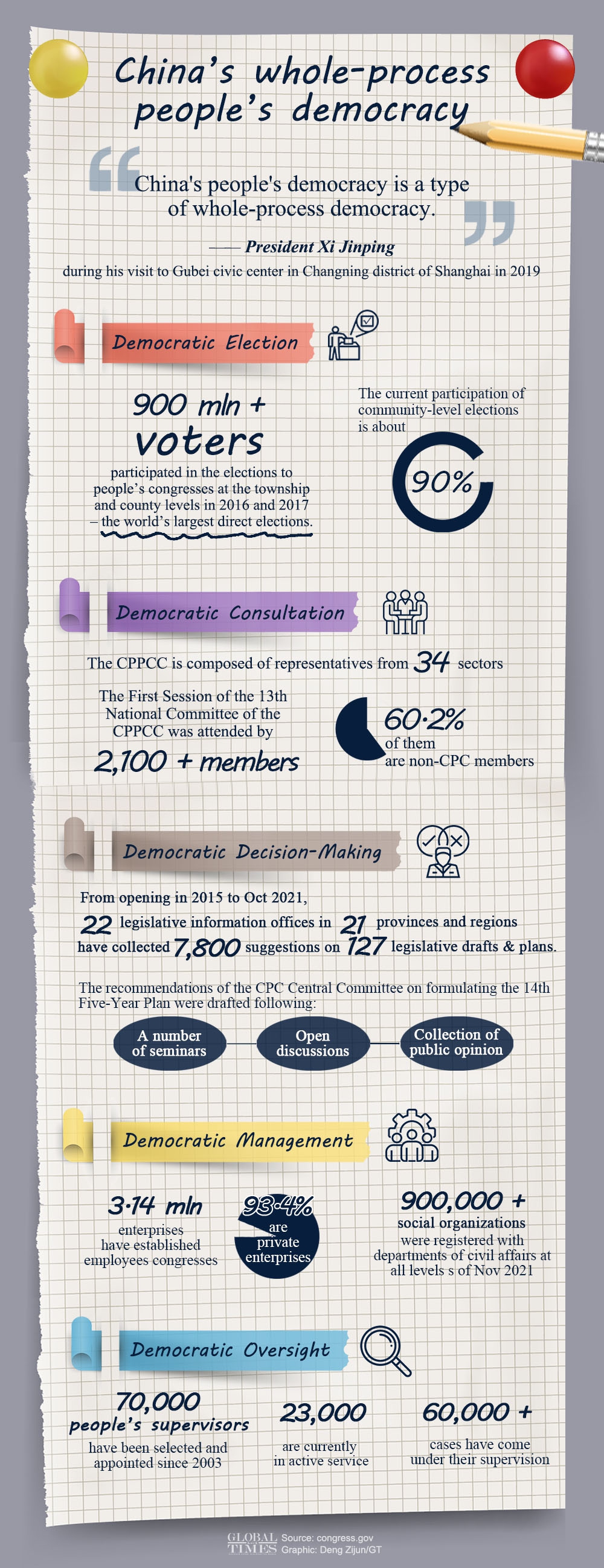
China’s democracy is not what is narrowly defined as one-man-one-vote, but an ideal and whole system of political structures to ensure the people’s status as the true masters of the country rather than “voting puppets.”
What is democracy?
For some, democracy is a value in crisis or a system that awakens the masses from four years of slumber just to cast a ballot.. But for the Chinese, it is something to go on about on a daily basis but something witnessed, experienced and participated in from a very young age, as democracy runs through every link of the country's governance.

Villagers in Dawang village, Suqian of East China's Jiangsu Province attend the village's "Happy Congress" on May 23, 2021. Photo: VCG
Learn, practice democracy from young ageIn March 2019, a group of high school students in Zhengzhou, Central China's Henan Province held a virtual meeting with Wang Zhongli, local education bureau chief and deputy to the 13th National People's Congress (NPC).
"How did you come up with the proposal suggesting that the central government allocate a budget for rural teachers to solve their housing difficulties? What kind of research did you do before proposing that?" student Lin Kexin asked.
Rural education is key to urbanization and rural revitalization. The proposal aims to solve teachers' worries and encourage them to stay in rural areas for the benefit of local children, Wang responded.
Wang added that concrete plans for housing and budget support for sharing education resources to villages via the internet came to maturity during his half-year field trip to villages in Henan.
Wang cares about rural students and is very approachable, a graduate of Zhengzhou Foreign Language School who attended the virtual meeting recalled, telling the Global Times that the NPC annual session was held 700 kilometers away in capital Beijing, a long distance away, but he still felt as though they were close because what was discussed by the deputies was relevant to ordinary people. The high school also has a Model NPC organization, similar to Model United Nations, where students learn and practice to better understand one of China's essential democratic participation processes.
At an event in May 2021, students mimic a meeting of Zhengzhou People's Congress with some submitting reports by environmental, education, and health authorities while others listen to reports, offer advice, and vote to approve them.
The people's congresses at all levels are local agencies of state power. All administrative, supervisory, judicial and procuratorial organs of the state are created by the people's congresses, according to a white paper released on December 4 that clearly and concisely introduces China's whole-process people's democracy.
The people's congresses have functions of legislation, appointment and removal of government officials, and decision-making and supervision of corresponding administrative levels. This system is China's fundamental political system, and the ultimate approach and optimal solution to guaranteeing the people's status as masters of the country.
Gong Xiaohong, an instructor with the high school Model NPC, told the Global Times that direct communication with NPC deputies enables the youth to better understand how the system is relevant to everyone, and how people's voices are heard and affect legislation and policies.
Via discussions on modeling event topics and the drafting of attendant reports, students have a deep understanding of governance problems in the society, ranging from reducing the school workload and cyber bullying, to epidemic control and animal protection.
The Model NPC events provide students with a vivid experience of how the local people's congress operates, Gong continued, adding that they can then grow into responsible "masters of the country." When they turn into adults and vote, they can fully understand how important the election process is and how sacred their ballots are.
Another program China launches to engage the youth in whole-process people's democracy is the Young Marxists program, which covers university students, state-owned enterprise employees, and village officials and social workers.
Trainees of the program not only receive lecture sessions on China's democratic revolution history and the development of China's democracy, but also engage in the process in person.
Via the program, young trainees with Marxist beliefs become officials, company leaders and social workers with the full awareness of the need to participate in the administration and discussion of state affairs, and evolve the capabilities to do so.
Looking into the process
The concept of whole-process people's congress was put forward by President Xi Jinping in 2019 during his visit to a civic center in Shanghai where legislation was discussed at local community level.
Whole-process people's democracy covers all sectors of the society through electoral democracy, consultative democracy and community-level democracy, and is applied through a combination of elections, consultations, decision-making, management and oversight.
People's status as masters of the country is the essence and most distinctive feature of China's democracy.
In a recent visit to Pingyao county, North China's Shanxi Province, the Global Times reporter witnessed how whole-process people's democracy is practiced in locals' daily lives: Villagers, mostly the elderly, sit down around trees debating topics like the education of their grandchildren or the allocation of resources.
Villagers do not blindly listen to village chiefs, but offer their suggestions. Sometimes they might even argue fiercely, while loud laughter bursts forth when they agree with each other.
They select village chiefs who can represent their interests and lead the village to a better future, and the process is a key component of China's community-level self-governance, one example of the basic-level democracy. Similarly, urban residents can select their community chiefs to represent their interests and needs.
The villagers also directly elect county-level people's congress deputies while higher-level people's congress delegates are elected indirectly.

Some Yao ethic people in traditional cloths vote for deputies of the local people's congress in Liuzhou, Southwest China's Guangxi Zhuang Autonomous Region on July 22, 2021. Photo: VCG
The villagers also directly elect county- and township-level people's congress deputies while higher-level people's congress delegates are elected indirectly. So far, about 2.5 million deputies of these two levels are elected directly by people and the participation reaches 90 percent.The Global Times also found multiple places, including Henan, have invited Young Marxists program trainees to audit meetings of local committees of the Chinese People's Political Consultative Conference (CPPCC), to learn about affairs discussed and allow them to play an advisory role.
Those trainees are prospective people's congresses deputies and Party or government officials making it important for them to observe, participate in the democracy practice, and become core forces in the country's governance, experts said.
Experts said it is a common misunderstanding that China only has one party. The correct way to put it is China has one governing party but is governed through multiparty cooperation and political consultation with the CPPCC as a crucial mechanism.
China's political party system is not a one-party rule system. Nor is it one in which multiple parties vie for power and govern in turn, read the white paper on China's democracy.
When the ruling power shifts among multiple parties, and when lawmakers are professional politicians, it is difficult for a democracy to avoid becoming hollow and superficial, experts said.
Under the US democratic system, politicians are agents of interest groups, rather than representing the interests of the majority of voters and the interests of the country as a whole.
Kong Yuan, a research fellow at the Chinese Academy of Social Sciences, said such democracy has led to oligarchy and created social strife, which are the root cause of governance problems, including racism and pandemic response failures.
Besides other parties, the CPPCC also involves major social organizations like All-China Federation of Trade Unions, All-China Federation of Women, representatives from different professions, religions and ethnic groups, as well as specially invited people from Hong Kong and Macao.
Representing people's benefits
When US democracy becomes a money-centric game for a chosen few, lawmakers can hardly draft bills that can bring about benefits to the common people.
In contrast, Chinese lawmakers are constantly listening to the people, via aforementioned direct exchanges with the public, via their communications in their daily work, and via the structure of basic-level contact stations for legislation.
Taking the Civil Code as an example, the draft passed through 10 reviews at the NPC Standing Committee, 10 open solicitations of public opinions, and three discussions of deputies to the NPC before it was voted through.
The people's voices are heard by their deputies, expressed online, and conveyed to legislators through the basic level points of contact for legislation. China now has 22 such points of contact at local people's congresses, as well as in universities, science parks and communities.
On the first floor of Gubei civic center in Hongqiao subdistrict, Changning district of Shanghai, a display cabinet shows pamphlets of China's laws and notes on soliciting people's opinions on draft laws. Since 2015, the neighborhood has been designated as a point of contact for legislation.
It is the civic center President Xi visited and raised the concept of whole-process people's democracy.
The contact point has so far solicited opinions on 60 draft laws and summarized and sorted through more than 1,000 suggestions, of which 92 have been adopted.
Wu Xinhui, a legislative coordinator and director of the Shanghai Kangming Law Firm, has been in charge of gathering people's opinions via door-to-door visits or through conducting interviews. Wu has witnessed how people have been encouraged and educated to participate in the legislative process.
Wu once handled a case in which a senior in her 90s had suffered from violence within the family and noticed that the draft Anti-Domestic Violence Law gives far more attention to children and women while the elderly, who also face domestic violence threats, are not as catered to by the law.
Wu proposed that elderly people suffering domestic violence be given special protection at a consultation meeting at the point of contact in September 2015. The amendment was later adopted by the top legislature.
"From the people and for the people, a whole-process people's democracy is not only manifested in the establishment of legislative contact points, but also in government decisions and actions related to people's livelihoods," Wu told the Global Times.
China is pushing anti-telecom fraud legislation forward and Zhang Yin, another coordinator, recalled a recent discussion session on the draft law. Ten resident representatives joined the discussion with great enthusiasm and one with the unfortunate experience of being swindled shared their personal story.
People participate in legal matters actively at the contact point because they feel attached and their commitments are reflected in the legislation process, Zhang told the Global Times.
Confidence out of effectiveness
Gong Xiaohong, the instructor, was impressed by how high school students are highly concerned with issues related to China's development, and how they developed a deep recognition of socialist democracy and had a strong sense of duty.
Students, white collar workers, as well as legislative contact points coordinators reached by the Global Times have shared the consensus that democracy in China is not what is narrowly defined as one-man-one-vote, but an ideal and whole system of political structures to ensure the people's status as the true masters of the country rather than "voting puppets."
According to the white paper, China's whole-process people's democracy integrates process-oriented with results-oriented democracy, procedural with substantive democracy, direct with indirect democracy, and the people's democracy with the will of the state. The model of socialist democracy covers all aspects of the democratic process and all sectors of society. It is a true democracy that works.
China does not talk much about its democratic system, demonstrating more by action than through hyperbolic sentiment, experts said, pointing out that the narrative of democracy has long been monopolized by the US and the West.
But now China is confidently expounding on its own democratic practice based on its own democratic practice, for example, in realizing the advent of a moderately prosperous society or Xiaokang, in the victory in the eradication of absolute poverty, and especially in the fight against the COVID-19 epidemic over the past year, Chang Jian, director of the Research Center for Human Rights at Tianjin-based Nankai University, told the Global Times.
David Ferguson, a foreign expert from the China Foreign Languages Publishing Administration who has been in China for more than 15 years, told the Global Times that the whole-process democracy involves people in a much more active way than Western-style democracy. China's democracy is about consultation, cooperation and consensus.
People are invited to be actively involved in the process of creating legislation, which is one of the most fundamental purposes of governance. They have the opportunity to be consulted and to participate in a lot of different ways via a lot of different organizations, said Ferguson, who is also a winner of the Chinese Government Friendship Award for promoting cultural exchanges between China and foreign countries.
The expert also pointed out that democracy is a way of involving people "on a continuous basis." Whereas in the west, people participate in direct elections but outside of that, there isn't much opportunity for involvement.
Only the feet know if the shoes fit.
Democracy is sustainable when it is compatible with a country's economic, social and cultural realities. Democracy lasts longer when it is born from inside rather than imposed by outside forces, Zheng Yongnian, a noted Chinese political scientist, said at an international forum on the shared human value of democracy on December 4.

China's democracy is not what is narrowly defined as one-man-one-vote, but an ideal and whole system of political structures to ensure the people's status as the true masters of the country rather than "voting puppets."
